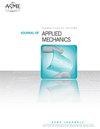QUANTIFICATION OF URETERAL PAIN SENSATION INDUCED BY KIDNEY STONE
IF 2.8
4区 工程技术
Q2 MECHANICS
引用次数: 0
Abstract
Pain sensation induced by kidney stone (renal calculi) in ureter, a kind of visceral ducts connecting the kidneys and bladder, critically depends upon the relative size of stone to ureter. To quantify such pain sensation, we draw a parallel analogy between the mechanisms underlying skin/teeth thermal pain (which can be quantified with a holistic pain model consisting of modified Hodgkin-Huxley model and gate control theory) and mechanism of ureteral pain to extend the holistic pain model to stone-blocked ureter. We then perform finite element simulations to obtain key mechanical stresses on ureter wall exerted by a kidney stone having varying size. These stresses are subsequently adopted to calculate the voltage potential of neuron membrane in the holistic pain model and eventually a theoretical framework to quantify the dependence of ureteral pain sensation on stone size is established, for the first time. We demonstrate that ureter pain sensation increases sharply when the diameter of kidney stone becomes 7.5% to 20% larger than the inner diameter of ureter, peaking at ~20% larger; however, increasing further the stone diameter leads only to marginally exacerbated pain sensation. Other related effects on ureter pain sensation, such as ureter wall thickness, ureter stiffness, and intra-abdominal pressure (IAP), are evaluated. Results of the present study provide insightful information for urologists to diagnose and treat patients with renal calculi in a more personalized way.肾结石所致输尿管疼痛感觉的定量测定
输尿管是连接肾脏和膀胱的一种内脏管道,输尿管内的肾结石(肾结石)引起的痛觉主要取决于结石与输尿管的相对大小。为了量化这种疼痛感觉,我们将皮肤/牙齿热痛的机制(可以用改进的霍奇金-赫胥黎模型和门控理论组成的整体疼痛模型进行量化)与输尿管疼痛的机制进行类比,将整体疼痛模型扩展到结石阻塞的输尿管。然后,我们进行有限元模拟,以获得不同大小的肾结石对输尿管壁施加的关键机械应力。在整体疼痛模型中,利用这些应力计算神经元膜的电压电位,最终首次建立了量化输尿管痛觉对结石大小依赖性的理论框架。我们发现,当肾结石直径比输尿管内径大7.5% ~20%时,输尿管疼痛感急剧增加,在大于输尿管内径约20%时达到峰值;然而,进一步增加结石直径只会轻微加重疼痛感。对输尿管疼痛感觉的其他相关影响,如输尿管壁厚度、输尿管硬度和腹内压(IAP)进行评估。本研究结果为泌尿科医师更个性化地诊断和治疗肾结石患者提供了有见地的信息。
本文章由计算机程序翻译,如有差异,请以英文原文为准。
求助全文
约1分钟内获得全文
求助全文
来源期刊
CiteScore
4.80
自引率
3.80%
发文量
95
审稿时长
5.8 months
期刊介绍:
All areas of theoretical and applied mechanics including, but not limited to: Aerodynamics; Aeroelasticity; Biomechanics; Boundary layers; Composite materials; Computational mechanics; Constitutive modeling of materials; Dynamics; Elasticity; Experimental mechanics; Flow and fracture; Heat transport in fluid flows; Hydraulics; Impact; Internal flow; Mechanical properties of materials; Mechanics of shocks; Micromechanics; Nanomechanics; Plasticity; Stress analysis; Structures; Thermodynamics of materials and in flowing fluids; Thermo-mechanics; Turbulence; Vibration; Wave propagation

 求助内容:
求助内容: 应助结果提醒方式:
应助结果提醒方式:


